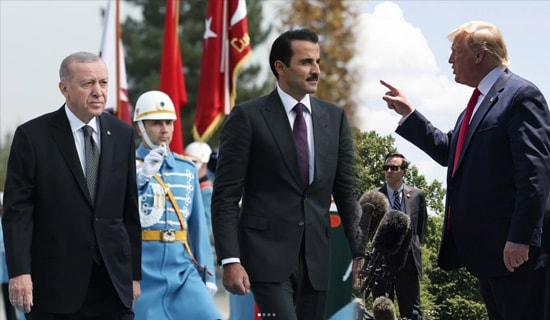On July 18, 2016, about a week after new U.S. Ambassador to Beirut Elizabeth Richard arrived in the country, the Lebanese daily Al-Akhbar, which is affiliated with Hizbullah, published an article by Sabah Ayub that harshly criticizing her and mocked her, attacking statements she had made to the Senate Foreign Relations Committee in March 2016 to the effect that Hizbullah was the source of Lebanon's economic, security, and political problems. Richard, according to Ayub, then called Hizbullah a threat to Lebanon, and underlined that the organization and its financial network should be targeted.
According to Ayub, Richard spoke "with familiar American insolence" and "waves a stick in the face of the Lebanese state before ever setting foot in it"; "her arrogance has [even] led her to speak on behalf of the Lebanese." In a dig at the Lebanese regime, he added that it wasn't lifting a finger against a diplomat who openly stated that she would fight Hizbullah from within the country.
It should be mentioned that this is not the first time that a newspaper close to Hizbullah has criticized the U.S. ambassador to Lebanon; in 2009, Talal Salman, owner of the Lebanese daily Al-Safir, scathingly attacked then-Ambassador Michele Sison, accusing her of interfering in the country's internal affairs, inciting civil war, and making provocative statements.[1]
Following are excerpts from Ayub's article in Al-Akhbar:[2]

Elizabeth Richard (image: Yalibnan.com, July 18, 2016)
"Elizabeth Richard, 56, appears very enthusiastic about working in Lebanon, where she took up her duties last week. In a video [distributed] by the U.S. Embassy, she said: 'I can't wait to explore Lebanon's cultural treasures and natural beauty'... The new American ambassador, who visited the 'land of the cCedars' in 2007 as part of an American initiative to train and arm the internal security forces, looks decisive in her first message to the Lebanese people, saying: 'As Lebanon works to maintain its security and build strong state institutions..., the American people will continue to stand with you.' This is flowery diplomatic language that hides the intentions of the American ambassador - which are not hidden [from us], particularly with regard to her view of [the concepts of] 'preserving its security' and 'strong state institutions.'
"[However,] a few months ago, Richard was much more explicit at a congressional hearing, after submitting her candidacy for the [ambassadorial] post, when [she, as] legal expert, announced her practical agenda... and promised that she would work to solve all of Lebanon's 'major challenges'! How? The picture is very clear to Richard, since [in her eyes] there is one source of all Lebanese economic, security, and political suffering: The resistance [i.e. Hizbullah].
"On the economic level, Richard revealed a magic formula for solving the Lebanese crisis, when she said [at the hearing]: 'Our goal is to dismantle Hizbullah's international financial network[3] while supporting Lebanese institutions and the Lebanese people. This will contribute directly to promoting Lebanon's economic prosperity.' How will damaging the international financing of the resistance lead to the recovery of the state's economy?! Richard did not explain this at the hearing, and was not required to do so in her country. Furthermore, the Lebanese state - the government and diplomatic corps - did nothing to demand answers regarding a diplomat openly stating that she would fight, from within [Lebanon], a Lebanese party that is represented in parliament and that participates in the government! No one dared to make demands or even to question the ambassador's statement. With the tone of someone who runs Lebanon's affairs, and with well-known American insolence, Richard said that she would ensure that 'Hizbullah cannot penetrate the Lebanese financial sector' because 'both Lebanon and the United States have an interest' in doing so. The new ambassador waved her stick in the face of the Lebanese state before ever setting foot in her host country, and without any of the officials being shocked by it.
"On the security level, Richard has her own personal philosophy. Israel, of course, was absent from her statements regarding the security threats surrounding Lebanon, which mostly focused on the Islamic State [ISIS] and [Jabhat] Al-Nusra. However, the ambassador appeared calm in light of the threat of the two organizations that emerged from the womb of Al-Qaeda, and is convinced that the partnership between the U.S. and Lebanon's security forces.. has had a decisive role in defending Lebanon against these threats, which is why the Lebanese should not fear ISIS and Jabhat Al-Nusra. But what is the first challenge for the state, in Richard's view? The answer: Hizbullah. 'Hizbullah's activities in Syria create serious security challenges for Lebanon,' said the ambassador, who promised to support the Lebanese army because it is the country's 'sole legitimate defender.'
"The third 'major challenge' for the Lebanese [after the economic and security challenges], according to Richard, is the political vacuum [a reference to the ongoing inability to select a president] and the damage to Lebanon's independence and sovereignty. [She says that] she will work to solve these issues as well, while cooperating with [Lebanese] 'voices for moderation and progress.' [But] against whom? Richard said: against Hizbullah's ongoing intervention in Syria - undertaken without the consent of the Lebanese people. So the new ambassador's arrogance has led her to speak on behalf of the Lebanese and she does not even cite figures, even false ones, to support her claim regarding the degree of Lebanese consent to, or disagreement with, Hizbullah's involvement in Syria.
"In short, as Richard told Congress: Hizbullah went [to fight] in Syria in defiance of the will of most Lebanese, which harms Lebanon's sovereignty and independence.
"Generally speaking, Western diplomats lack the ability to understand events in Lebanon and to grasp the complexity of its society, regime, economics, and politics. [However,] Richard appears to have such an ability, as her opinion is clear and her goal is singular: to damage the Lebanese resistance [Hizbullah], its party, its men, and its finances, by any means necessary.
"In her previous role, before becoming the guardian of the Lebanese, Richard was Deputy Assistant Secretary of State for the Bureau of Near Eastern Affairs. At a July 2015 congressional hearing, she bragged about the State Department's achievements, and enumerated projects that she had personally supervised, including: establishing and developing Qualifying Industrial Zones [QIZs]; creating job opportunities; fueling exports in Egypt, Jordan, and Israel; brokering a deal between General Motors [sic; it was General Electric] and Egypt to provide a large amount of power to Egypt; establishing railroads in Algeria; purchasing tons of Iraqi rice [sic. the report at the hearing was of Iraq buying rice from the U.S.]; encouraging investments in the Gulf states; supporting youth initiatives; and medical collaborations between Israel and the UAE. Most Middle Eastern and North African countries are included in the [list] of achievements last year by Richard and her State Department, but Lebanon is not. And here she arrives today, in the most helpless country in the region, with a single political plan - and not a development plan, but promises for arming, and a brandished stick!"
Endnotes:
[1] See MEMRI Special Dispatch No. 2630, Owner of Lebanese Pro-Syrian Daily 'Al-Safir': "Silence That Chatterbox [U.S.] Ambassador!", November 4, 2009.
[2] Al-Akhbar (Lebanon), July 18, 2016.
[3] On the economic sanctions recently imposed by the U.S. on bodies and figures associated with Hizbullah, and on the organization's response to the sanctions, see MEMRI Inquiry & Analysis No. 1248, As Lebanon's Banks Begin To Implement U.S. Sanctions Against Hizbullah, Hizbullah Criticizes Banking Sector, Warns Of Chaos In Lebanon And More 'Actions Against The American Takeover Plan, May 17, 2016; Inquiry & Analysis No. 1258, Both Before And After Lebanese Bank Bombing, Hizbullah Supporters Incited Against Banking Sector And Central Bank Governor, Threatened Further Escalation That Would Impact Country's Future,
June 27, 2016; Special Dispatch No. 6452, London-Based 'Al-Sharq Al-Awsat': Lebanese Government Paying Salaries Of Hizbullah MPs, Ministers In Cash To Bypass Potential American Sanctions, May 31, 2016.




.jpg)